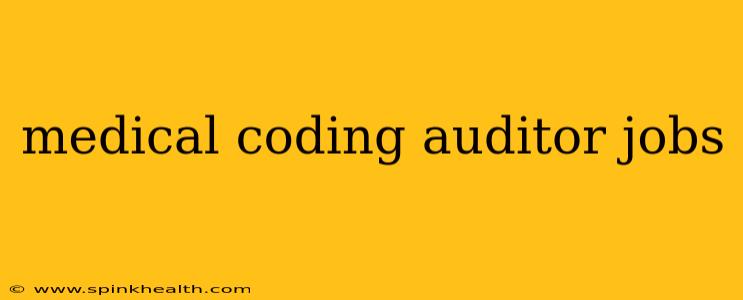Decoding the World of Medical Coding Auditor Jobs: A Career Deep Dive
The world of healthcare is complex, a intricate tapestry woven with patient stories, medical procedures, and a mountain of paperwork. At the heart of this paperwork lies medical coding, the crucial process of translating medical diagnoses and procedures into standardized alphanumeric codes used for billing and record-keeping. And safeguarding the accuracy and integrity of this system are the unsung heroes: medical coding auditors. Their role is vital, ensuring that healthcare providers are billing correctly, complying with regulations, and ultimately, protecting both patients and the healthcare system's financial stability.
This isn't just about numbers and codes; it’s about ensuring ethical and accurate representation of patient care. It's a career path that demands meticulous attention to detail, a sharp eye for discrepancies, and a deep understanding of medical terminology and regulatory compliance. But for those with the right skills and dedication, a career as a medical coding auditor offers a rewarding blend of intellectual challenge and meaningful contribution.
Let's unravel some of the common questions surrounding this fascinating field:
What Does a Medical Coding Auditor Do?
Imagine being a detective, but instead of solving crimes, you're uncovering inaccuracies in medical billing. That's the essence of a medical coding auditor's job. They meticulously review medical records, comparing the diagnoses, procedures, and services provided with the corresponding codes used for billing. Their goal is to identify any coding errors, inconsistencies, or fraudulent activities. This often involves:
- Chart review: Thoroughly examining patient medical records, including physician notes, lab results, and diagnostic imaging reports.
- Code verification: Checking that the codes used align with the medical documentation and comply with established coding guidelines (e.g., ICD-10, CPT, HCPCS).
- Compliance audits: Ensuring adherence to regulatory requirements set by organizations like CMS (Centers for Medicare & Medicaid Services), HIPAA (Health Insurance Portability and Accountability Act), and other relevant bodies.
- Identifying trends and patterns: Looking for recurring errors or potential fraudulent activities within a healthcare facility or provider's billing practices.
- Preparing reports and recommendations: Documenting their findings, highlighting areas needing improvement, and suggesting corrective actions to ensure accurate billing and compliance.
What Skills Do I Need to Become a Medical Coding Auditor?
This career path isn't for the faint of heart. It demands a unique blend of hard and soft skills:
- Strong medical terminology and coding knowledge: A deep understanding of ICD-10, CPT, and HCPCS coding systems is paramount.
- Analytical skills: The ability to meticulously review medical records, identify discrepancies, and draw accurate conclusions is crucial.
- Attention to detail: Even a small coding error can have significant financial implications, so precision is essential.
- Regulatory knowledge: A solid understanding of healthcare regulations, including HIPAA and CMS guidelines, is vital.
- Communication skills: Clearly communicating findings to healthcare providers and other stakeholders is critical.
- Problem-solving skills: Identifying and resolving coding issues requires a systematic and logical approach.
What Education and Certification Are Required?
While the specific educational requirements can vary depending on the employer, a strong foundation in healthcare administration, medical coding, or a related field is typically preferred. Many successful medical coding auditors have an associate's or bachelor's degree in health information management (HIM) or a related field. Professional certifications, such as Certified Professional Coder (CPC) or Certified Audit Specialist (CAS), are highly valuable and often enhance job prospects.
What Are the Career Prospects and Salary Expectations?
The demand for skilled medical coding auditors is steadily increasing, driven by the growing complexity of healthcare billing and the increasing emphasis on regulatory compliance. The Bureau of Labor Statistics projects strong growth for healthcare occupations, which bodes well for the future of this career path. Salary expectations vary based on experience, location, and certification, but medical coding auditors can expect competitive compensation.
Is Medical Coding Auditing a Good Career Choice?
For individuals passionate about healthcare, detail-oriented, and interested in a blend of analytical and investigative work, medical coding auditing can be a highly rewarding career choice. It offers the satisfaction of contributing directly to the integrity of the healthcare system while leveraging strong analytical skills and knowledge of medical coding. The increasing demand, competitive salary potential, and the opportunity to make a meaningful difference make it a compelling career path for those who meet the challenges head-on.

